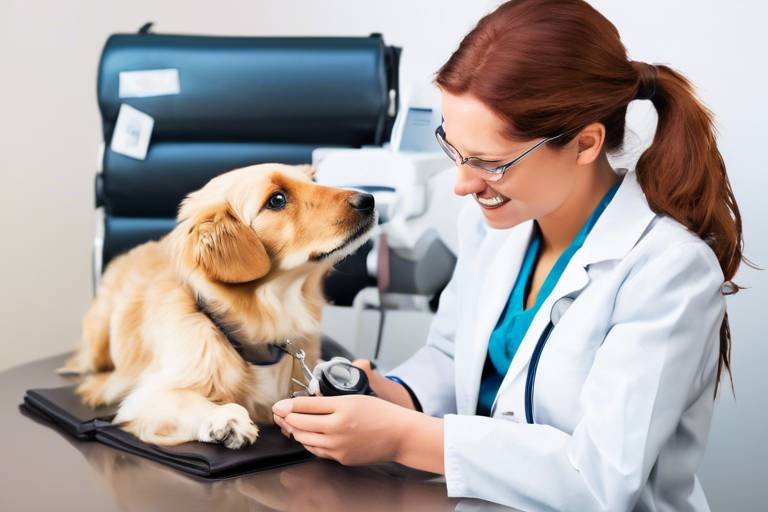The Importance of Pre-Travel Vet Checks for Pets
Traveling with your furry friend can be one of the most rewarding experiences, but it also comes with its own set of challenges. Before you embark on your adventure, have you considered the importance of pre-travel vet checks? These essential evaluations are not just a formality; they are a crucial step in ensuring your pet's health and safety during the journey and at your destination. Imagine setting off on a long road trip or a flight, only to discover that your pet is unwell or at risk of contracting diseases that could have been prevented. This is where a thorough vet check becomes invaluable.
Pre-travel vet checks serve as a comprehensive assessment of your pet's health, allowing you to identify any potential issues that could pose risks during transit. Think of it as giving your pet a health passport—one that guarantees they are fit and ready for the journey ahead. With the right preparation, you can avoid unnecessary stress and ensure that your pet is not only safe but also comfortable throughout the trip.
But what exactly happens during these vet checks? Typically, a veterinarian will conduct a detailed health assessment, checking for any underlying conditions that could affect your pet's ability to travel. This includes evaluating their physical condition, checking for any signs of illness, and ensuring that they are up to date on all necessary vaccinations. By addressing these factors beforehand, you can prevent a host of potential problems that could arise during your travels.
Furthermore, many destinations have specific requirements for pet travel, including health certificates and proof of vaccinations. A veterinarian can help you navigate these regulations, ensuring that you have all the necessary documentation. This not only saves you time and hassle but also gives you peace of mind knowing that you’ve done everything possible to prepare your pet for the journey.
In summary, pre-travel vet checks are an essential component of responsible pet ownership. They provide a safety net that protects your pet from unforeseen health issues and ensures compliance with travel regulations. So, before you pack your bags and hit the road, make sure to schedule that all-important vet appointment. Your pet will thank you for it!
- How far in advance should I schedule a pre-travel vet check?
It's best to schedule the vet check at least a month before your travel date to ensure you have enough time to address any health concerns and obtain necessary documents. - What should I bring to the vet appointment?
Bring your pet's medical history, vaccination records, and any travel documentation required by your destination. - Are there specific vaccinations required for travel?
Yes, many destinations require certain vaccinations, such as rabies, to prevent the spread of diseases. Your vet can provide guidance on what is needed. - Can I travel with my pet if they have a pre-existing condition?
It depends on the condition. Consult your veterinarian to determine if your pet is fit for travel and what precautions you should take.

Understanding Pre-Travel Vet Checks
When it comes to traveling with your furry companions, pre-travel vet checks are not just a luxury; they are a necessity. Imagine planning a dream vacation only to find out that your pet is not fit for travel. That’s where these vital checks come into play. They serve as a comprehensive evaluation to ensure that your pet is healthy and ready for the adventure ahead. The primary goal is to identify any potential health issues that could pose risks during transit or at your destination.
During these vet checks, veterinarians perform a series of assessments that cover various aspects of your pet's health. This includes checking their vital signs, examining their coat and skin, and assessing their overall demeanor. Just like we humans have our check-ups before long trips, pets need the same attention to detail. After all, a healthy pet is a happy pet, and a happy pet makes for a stress-free journey!
Moreover, pre-travel vet checks involve ensuring that your pet's vaccination records are up to date. Some destinations have strict requirements regarding vaccines to prevent the spread of diseases. For instance, if you plan to travel internationally, you may need to provide proof of specific vaccinations. This process can be daunting, but a knowledgeable vet can guide you through the necessary steps, making sure you have all the required documents in hand.
Additionally, these checks often include evaluations for parasites such as ticks, fleas, and worms. Just like we wouldn’t want to travel with an unwanted hitchhiker, your pets shouldn’t either! Preventive treatments can be administered during the vet visit, ensuring that your pet is protected from any potential infestations that could occur during travel. It's like packing a first-aid kit for your pet, making sure they are ready for whatever comes their way.
In summary, pre-travel vet checks are a crucial step in ensuring a smooth and enjoyable traveling experience for both you and your pet. They not only help in preventing illness but also provide you with peace of mind knowing that your furry friend is in tip-top shape. So, before you pack your bags, make sure you schedule that all-important visit to the vet!

Benefits of Pre-Travel Vet Checks
When it comes to traveling with our beloved pets, ensuring their health and safety is paramount. Pre-travel vet checks are not just a formality; they are a crucial step in safeguarding our furry friends. One of the primary benefits of these checks is the ability to prevent illness. Imagine planning a perfect getaway, only to have your pet fall ill during the trip. A thorough vet check can help identify potential health issues before they become a problem, allowing for timely interventions.
Another significant advantage is ensuring that your pet's vaccinations are up to date. Certain destinations have specific vaccination requirements to prevent the spread of diseases. For example, if you’re heading to a tropical location, your pet may need vaccinations against diseases prevalent in that area. By visiting the vet beforehand, you’ll not only comply with these regulations but also protect your pet from unnecessary risks.
Furthermore, pre-travel vet checks often include assessments for parasites. Fleas, ticks, and worms are not just nuisances; they can pose serious health threats to your pet. Administering preventive treatments during the vet visit can significantly reduce the risk of your pet encountering these harmful parasites while traveling. This proactive approach can save you from a lot of headaches later on, whether it’s dealing with a sick pet or facing unexpected veterinary bills.
Additionally, these checks provide peace of mind for pet owners. Knowing that your pet has been thoroughly evaluated and is fit for travel allows you to focus on enjoying your trip. It’s like having a safety net; you can relax knowing that your furry companion is healthy and ready for adventure. After all, no one wants to be worrying about their pet's health while trying to enjoy a vacation!
In conclusion, the benefits of pre-travel vet checks are manifold. They not only help in preventing illnesses and ensuring vaccinations are current, but they also protect against parasites and provide peace of mind for pet owners. Investing in a vet check before your travels can make all the difference in ensuring a smooth and enjoyable experience for both you and your pet.
Health Assessments
When it comes to ensuring your furry friend is ready for travel, are the cornerstone of pre-travel vet checks. Think of it as a thorough check-up before a big adventure—just like you wouldn't embark on a long road trip without making sure your car is in tip-top shape, your pet deserves the same level of care. During a health assessment, a veterinarian will conduct a comprehensive examination to identify any underlying health issues that could spell trouble during your journey.
These assessments typically include a physical examination, where the vet checks vital signs, listens to the heart, and examines the ears, eyes, and mouth. This thorough approach can reveal hidden conditions, such as dental disease or heart murmurs, which might not be immediately obvious but could become problematic during travel. For instance, imagine your pet experiencing discomfort or pain while confined in a travel carrier—this could lead to a stressful experience for both you and your pet.
Moreover, the vet will likely ask about your pet's medical history, including any previous illnesses, surgeries, or medications. This information is crucial for tailoring the health assessment to your pet's specific needs. If your pet has a chronic condition, such as diabetes or arthritis, the vet can provide guidance on how to manage these issues while traveling. It’s like having a personalized travel plan that keeps your pet’s health at the forefront.
In addition to the physical check-up, the vet may also perform laboratory tests if necessary. These tests can include blood work or urinalysis to check for any hidden infections or abnormalities. It's a proactive approach that ensures any potential health risks are identified and addressed before you hit the road.
Ultimately, a thorough health assessment does more than just check for current health issues; it provides a comprehensive overview of your pet's well-being. This gives you the confidence you need to travel without worrying about unexpected health problems cropping up. After all, a happy pet leads to a happy journey!
- How often should I get my pet checked before traveling? It's advisable to schedule a vet check at least a few weeks before your trip, allowing time for any necessary treatments or vaccinations.
- What should I bring to the vet for the health assessment? Bring your pet’s medical records, a list of any medications they are currently taking, and any questions you might have for the vet.
- Are health assessments required for all travel destinations? Not all destinations require health assessments, but they are highly recommended to ensure your pet's safety and compliance with travel regulations.
Vaccination Updates
When it comes to traveling with your furry friend, keeping their vaccinations up to date is not just a good idea—it's essential! Imagine planning a trip to a beautiful destination, only to find out that your pet is at risk of contracting a disease because they weren't properly vaccinated. Some places have specific vaccination requirements that must be met before your pet can even set paw in the area. For instance, certain countries require pets to have rabies vaccinations administered at least 21 days before entering their borders. This is not just a bureaucratic hurdle; it’s a crucial step in protecting your pet's health and the health of other animals and humans they may encounter.
The importance of vaccination updates cannot be overstated. A simple visit to the vet can ensure that your pet is not only compliant with travel regulations but also shielded from preventable diseases. During the pre-travel vet check, your veterinarian will review your pet's vaccination history and administer any necessary boosters. This proactive approach can save you from potential heartache down the road, as illnesses like parvovirus or distemper can be devastating and are often avoidable with proper vaccinations.
Additionally, some vaccinations may be required based on your travel destination. For example, if you're heading to a tropical location, your pet might need vaccinations against diseases like leptospirosis or dengue fever. It’s like packing a safety net for your pet’s health. You wouldn’t leave home without your passport, right? Well, your pet’s health records and vaccination certificates are their passport to a safe and happy journey.
To help you understand the various vaccinations your pet may need, here's a quick overview:
| Vaccination | Recommended Age | Notes |
|---|---|---|
| Rabies | 12 weeks and older | Required for international travel |
| Distemper | 6-8 weeks, then every 3 years | Highly contagious; vital for travel |
| Parvovirus | 6-8 weeks, then every 3 years | Common in unvaccinated pets |
| Bordetella (Kennel Cough) | 8 weeks and older | Especially important for boarding or travel |
In summary, keeping your pet’s vaccinations current is a vital part of pre-travel preparations. It not only protects your pet but also ensures compliance with travel regulations. So, before you pack your bags, make sure to check your pet's vaccination status. It’s a small step that can lead to a big difference in their health and happiness during your travels!
- How far in advance should I schedule a vet check before traveling?
It's best to schedule your vet check at least 2-4 weeks before your trip to allow time for any vaccinations or treatments that may be needed. - What if my pet has a reaction to a vaccination?
While reactions are rare, it's important to monitor your pet closely after vaccinations. If you notice any unusual behavior or symptoms, contact your veterinarian immediately. - Can I travel with my pet if they are not vaccinated?
Many destinations require proof of vaccinations for pets. Traveling without them could result in being turned away or facing quarantine. - What documents do I need to bring for my pet when traveling?
Make sure to bring your pet's vaccination records, health certificates, and any other required documentation specific to your destination.
Parasite Prevention
When it comes to traveling with your furry friends, one of the most crucial aspects to consider is . Just like humans, pets can be vulnerable to various parasites that can wreak havoc on their health, especially during the stress of travel. Imagine your pet, excited and ready for an adventure, only to be sidelined by an infestation of fleas or ticks. Not only is this uncomfortable for them, but it can also lead to serious health complications. That’s why a thorough vet check before your journey is essential.
During a pre-travel vet check, your veterinarian will typically perform a comprehensive examination to identify any existing parasite issues. This is not just a cursory glance; it involves checking for common parasites such as fleas, ticks, and worms. If any are found, your vet can provide immediate treatment to safeguard your pet’s well-being. Furthermore, preventive medications can be administered to keep your pet protected throughout the trip, ensuring they remain healthy and happy.
Additionally, the risk of parasites can vary significantly depending on your travel destination. For instance, some areas may have a higher prevalence of ticks that can transmit diseases like Lyme disease. Your vet can inform you about the specific risks associated with your travel plans and recommend appropriate preventive measures. This might include:
- Topical treatments: These are applied directly to your pet’s skin and can repel or kill parasites.
- Oral medications: These can provide systemic protection against parasites for a longer duration.
- Vaccinations: Some diseases transmitted by parasites can be prevented through vaccination, so be sure to discuss this with your vet.
In conclusion, parasite prevention is not just a precaution; it’s a vital part of ensuring a smooth and enjoyable travel experience for both you and your pet. By taking the time to address this aspect during your pre-travel vet check, you’ll not only protect your beloved companion but also enjoy peace of mind while creating unforgettable memories on your journey.
Q: How often should I have my pet checked for parasites?
A: It’s recommended to have your pet checked for parasites at least once a year, but if you travel frequently or live in an area with high parasite prevalence, more frequent checks may be necessary.
Q: What are the signs that my pet might have parasites?
A: Common signs include excessive scratching, hair loss, lethargy, vomiting, or diarrhea. If you notice any of these symptoms, consult your veterinarian.
Q: Are there any side effects of parasite prevention medications?
A: While most pets tolerate preventive medications well, some may experience mild side effects such as gastrointestinal upset. Always discuss potential side effects with your veterinarian.
Q: Can I use over-the-counter products for parasite prevention?
A: While some over-the-counter products can be effective, it’s best to consult your veterinarian for recommendations tailored to your pet’s specific needs and health status.
Travel Requirements
When planning to travel with your furry friend, understanding the specific travel requirements for pets is crucial. Each destination may have its own set of rules that pet owners must follow to ensure a smooth journey. This can include everything from health certificates to vaccination records, and even specific regulations about the type of carrier you can use. Failing to comply with these requirements can lead to unnecessary stress, delays, or even the inability to travel altogether.
One of the primary documents you’ll need is a health certificate, which is typically issued by a veterinarian. This certificate verifies that your pet is healthy and free from contagious diseases. It’s essential to have this document prepared within a specific time frame before your trip, often within 10 days of travel. Additionally, some destinations may require proof of vaccinations against diseases like rabies, which means you should check if your pet’s vaccinations are current and meet the local regulations.
In addition to health certificates and vaccination records, it’s important to be aware of any quarantine regulations that might apply. Some countries have strict protocols that require pets to be quarantined upon arrival if they do not meet specific health standards. This can be a daunting prospect, so being proactive about your pet's health checks can save you a lot of hassle. Furthermore, certain airlines have their own regulations regarding pet travel, which may include carrier specifications, weight limits, and even fees associated with bringing your pet on board.
To make the process smoother, it’s advisable to compile all necessary documents and keep them organized. Consider creating a travel checklist that includes:
- Health certificate from your veterinarian
- Proof of vaccinations
- Microchip information
- Travel carrier specifications
- Emergency contacts
By staying informed and prepared with the right documentation, you can ensure that your pet travels safely and comfortably. Remember, the goal is to make the journey as enjoyable as possible for both you and your four-legged companion. So, take the time to research the requirements for your specific destination and consult with your veterinarian to avoid any last-minute surprises!
Q: How far in advance should I schedule a vet check before traveling?
A: It's best to schedule the vet check at least 2-3 weeks before your travel date to ensure you have enough time to address any health issues and obtain necessary documentation.
Q: What if my pet has a pre-existing health condition?
A: If your pet has a pre-existing condition, consult your veterinarian for tailored advice on how to manage your pet's health during travel and ensure compliance with any specific regulations.
Q: Are there any specific vaccinations required for international travel?
A: Yes, many countries have specific vaccination requirements, particularly for rabies. Always check the regulations of your destination country well in advance of your travel date.
Q: Can I travel with my pet on a plane?
A: Yes, many airlines allow pets to travel, but they have specific rules regarding carriers, weight limits, and fees. Always check with your airline before booking your flight.

Choosing the Right Veterinarian
When it comes to ensuring your furry friend is ready for travel, choosing the right veterinarian is absolutely crucial. Not all vets are created equal, especially when it comes to understanding the unique needs of pets traveling to different destinations. A veterinarian experienced in travel-related issues can provide tailored advice that aligns with the specific requirements of your journey. This is not just about a quick check-up; it’s about ensuring your pet’s health and safety throughout the entire travel experience.
One of the first steps in selecting a veterinarian is to look for someone who has a solid understanding of travel regulations. Different countries and even states have varying requirements for pet travel, including health certificates and vaccinations. A knowledgeable vet will not only be aware of these regulations but will also ensure that your pet meets all necessary health standards before you embark on your adventure. Think of your veterinarian as your travel guide for your pet's health—someone who knows the ropes and can help you navigate through the complexities of pet travel.
Moreover, it’s essential to consider the vet's experience and reputation. A good way to gauge this is by seeking recommendations from fellow pet owners or checking online reviews. Ask your friends, family, or even local pet communities for their suggestions. Additionally, platforms like social media or pet forums can provide insights into other pet owners' experiences. Look for veterinarians who have received positive feedback for their thoroughness and care when it comes to pre-travel checks. You want someone who treats your pet like family, not just another appointment on their schedule.
In your search, don’t hesitate to schedule a preliminary consultation. This gives you a chance to meet the veterinarian, ask questions, and assess their approach to pet care. During this visit, you can inquire about their experience with travel-related health checks, the types of vaccinations they recommend, and how they handle any potential health issues that might arise. A good vet will be open to discussing your concerns and will provide clear, concise information that helps you feel confident in your choice.
Lastly, consider the clinic's overall environment. A clean, well-organized clinic with friendly staff often reflects the quality of care provided. Pay attention to how the staff interacts with pets and their owners. It’s essential that you and your pet feel comfortable and welcomed. After all, a stress-free environment can make a world of difference for both of you, especially during what can often be a stressful time.
In summary, choosing the right veterinarian for your pet's pre-travel check is a vital step in ensuring a smooth journey. By looking for someone experienced with travel regulations, seeking recommendations, scheduling consultations, and assessing the clinic environment, you can make an informed decision that prioritizes your pet's health and safety.
- Why are pre-travel vet checks important? They help ensure your pet is healthy and fit for travel, preventing potential health issues during the journey.
- What should I look for in a veterinarian? Look for experience with travel regulations, positive reviews, and a welcoming clinic environment.
- How far in advance should I schedule a vet check? Ideally, schedule the check at least a few weeks before your travel date to allow time for any necessary vaccinations or treatments.
- Can my regular vet handle pre-travel checks? Yes, as long as they are familiar with the travel requirements for your destination.
Experience with Travel Regulations
When it comes to traveling with your furry friend, understanding the nuances of travel regulations is crucial. Each country, and even states within countries, can have different requirements for pets. This is where a veterinarian with experience in travel regulations becomes your best ally. They are well-versed in the specific health certificates, vaccination records, and any additional documents that may be required for your pet to enter a new destination without a hitch.
For instance, if you’re planning a trip to Europe, many countries require a rabies vaccination certificate that must be administered at least 21 days before travel. Without this, you could face delays, quarantines, or even the heartbreaking decision of leaving your pet behind. A knowledgeable vet will not only ensure that your pet's vaccinations are up to date but also guide you through the maze of paperwork needed for a smooth journey.
Moreover, veterinarians can provide insights on country-specific regulations. For example, some countries have strict rules about certain breeds, while others may require specific treatments for parasites before entry. By consulting with a vet who understands these regulations, you can avoid the stress of last-minute scrambles to meet compliance. They can even assist in filling out forms or obtaining necessary documents, making the entire process feel less daunting.
Additionally, a good veterinarian will stay updated on changing regulations. Travel laws can shift rapidly, especially in response to health crises or outbreaks. Having a professional who keeps their finger on the pulse of these changes can save you from unexpected surprises that could jeopardize your travel plans. You wouldn’t want to arrive at the airport only to find out your pet is missing a required vaccine or document!
In summary, when selecting a veterinarian, look for one who has a proven track record with travel-related issues. Their expertise can make a world of difference in ensuring that your pet's travel experience is as smooth as possible. After all, a little preparation goes a long way in keeping your beloved companion safe and healthy during your adventures.
- What documents do I need for my pet to travel? Typically, you'll need a health certificate, vaccination records, and sometimes a rabies certificate, depending on your destination.
- How far in advance should I schedule a vet check? It's best to schedule a vet check at least a month before your travel date to allow time for any necessary vaccinations or treatments.
- Can my pet travel if they have a medical condition? It depends on the condition. Always consult with your veterinarian to determine if travel is safe for your pet.
- Are there breed restrictions for pet travel? Yes, some countries have restrictions on certain breeds, so it's essential to check the regulations for your destination.
- What should I do if my pet gets anxious while traveling? Talk to your vet about potential calming solutions, such as medications or natural remedies.
Recommendations and Reviews
When it comes to ensuring your furry friend is ready for travel, finding the right veterinarian is crucial. You wouldn’t trust just anyone to care for your pet, right? It’s essential to choose a vet who not only understands general pet care but is also well-versed in pre-travel requirements. One of the best ways to start your search is by seeking recommendations from fellow pet owners. Ask friends, family, or even your local pet community for their experiences with veterinarians who specialize in travel-related checks. Their insights can be invaluable in helping you find a trustworthy professional.
In addition to personal recommendations, don’t underestimate the power of online reviews. Websites like Yelp, Google Reviews, and even social media platforms can provide a wealth of information about local veterinarians. Look for vets with consistently high ratings and positive feedback, especially those who have experience with international travel regulations. Pay attention to comments regarding their communication skills, staff friendliness, and the overall environment of the clinic.
Moreover, consider visiting a few clinics before making your final decision. During your visit, observe how the staff interacts with pets and their owners. A welcoming atmosphere can make a world of difference, not just for you but for your pet as well. Ask the veterinarian specific questions about their experience with travel checks, and don’t hesitate to inquire about any concerns you may have regarding your pet’s health and travel safety.
Lastly, you might want to check if the veterinarian is accredited by professional organizations, such as the American Animal Hospital Association (AAHA). Accreditation often indicates that the clinic meets high standards in veterinary care. Here’s a quick checklist you can use during your search:
| Criteria | What to Look For |
|---|---|
| Experience | Look for veterinarians with a proven track record in travel-related checks. |
| Reviews | High ratings and positive feedback from other pet owners. |
| Communication | Ability to clearly explain procedures and address concerns. |
| Accreditation | Membership in professional organizations like AAHA. |
| Facility Environment | A clean, welcoming, and pet-friendly atmosphere. |
By following these guidelines, you can ensure that your pet receives the best care possible before embarking on your travel adventure. Remember, the right veterinarian can make all the difference in ensuring a safe and enjoyable journey for both you and your beloved companion.
- How far in advance should I schedule a vet check before travel? It's best to schedule the vet check at least 2-4 weeks prior to your travel date to allow time for any necessary vaccinations or treatments.
- What documents should I bring to the vet for a pre-travel check? Bring your pet's vaccination records, any previous health issues, and details about your travel plans.
- Can I get a health certificate on the same day as the vet check? It depends on the vet's assessment. If your pet is healthy and all vaccinations are current, it may be possible.
Frequently Asked Questions
- What is a pre-travel vet check?
A pre-travel vet check is a thorough evaluation of your pet's health conducted by a veterinarian before traveling. This check ensures that your pet is fit for travel and helps identify any potential health issues that could arise during the journey.
- Why are pre-travel vet checks important?
These checks are crucial for several reasons, including preventing illness, ensuring vaccinations are up to date, and providing peace of mind for pet owners. They help ensure that your pet is healthy enough to handle the stresses of travel and meet any destination-specific requirements.
- What does a pre-travel vet check involve?
A typical pre-travel vet check includes a comprehensive health assessment, vaccination updates, and evaluations for parasites. Your vet will check for any underlying health issues and ensure that all necessary vaccinations are administered.
- How can I find a veterinarian experienced in travel-related issues?
Look for recommendations from friends or family, and read online reviews to find a reputable vet. It's essential to choose someone familiar with travel regulations and who can provide tailored advice for your pet's specific needs.
- What travel requirements should I be aware of?
Travel requirements vary by destination and may include health certificates, proof of vaccinations, and parasite prevention treatments. Your veterinarian will help you understand these requirements and ensure all necessary documents are prepared before your trip.
- How far in advance should I schedule a pre-travel vet check?
It's best to schedule your pre-travel vet check at least a few weeks before your departure date. This allows ample time for any necessary vaccinations or treatments and ensures that you have all required documentation ready for your journey.
- What if my pet has a health condition?
If your pet has a pre-existing health condition, it's crucial to discuss this with your veterinarian during the check-up. They can provide guidance on how to manage the condition during travel and whether your pet is fit to travel.



















